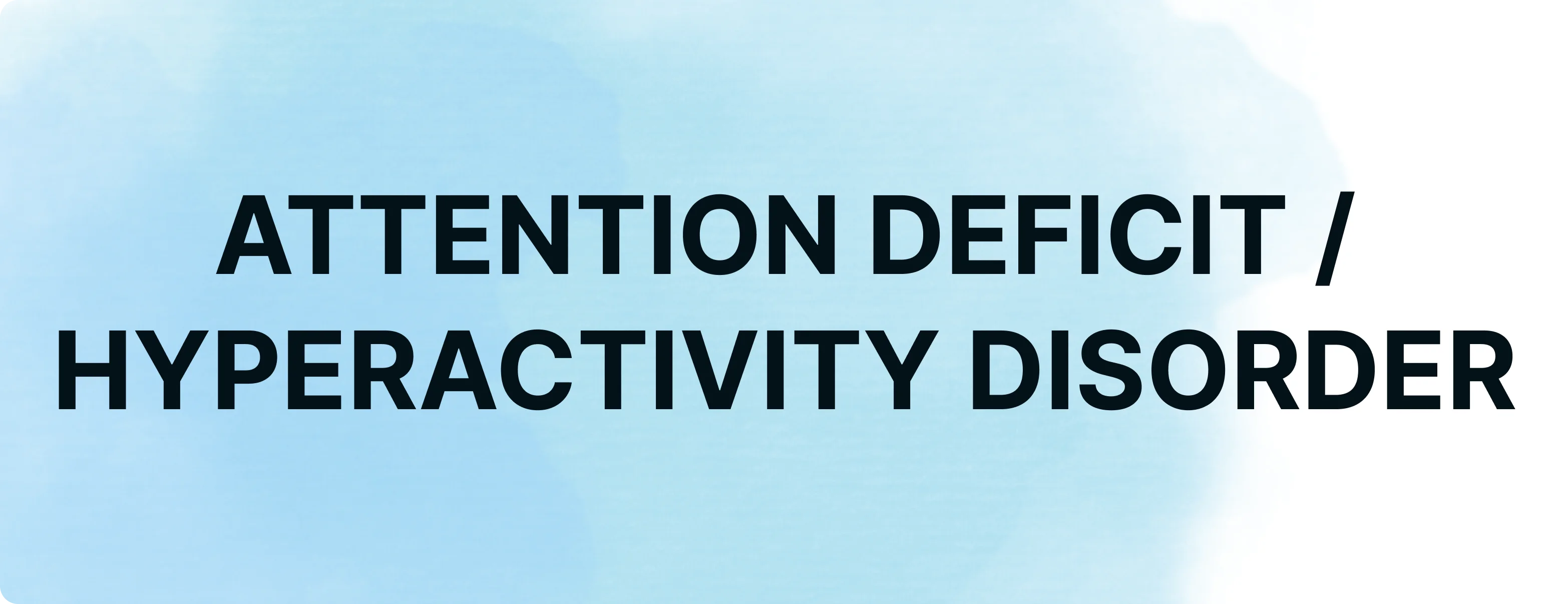What Is ADHD? Signs, Reading Challenges, Diagnosis & Treatment Explained

Chelsea DiMarzio
|
Published on Feb 15, 2024 : 8 min read


Chelsea DiMarzio
|
Published on Feb 15, 2024 : 8 min read

Is your child struggling with reading, but they do not meet the criteria to have dyslexia? This is a frustrating reality for many parents, and we are going to explore in this blog why Attention-Deficit Hyperactivity Disorder (ADHD) might be the missing link.
There are a lot of misconceptions about ADHD - what it is, and what it is not. Let’s start with a brief definition: ADHD is a neurodevelopmental disorder characterized by persistent patterns of inattention, impulsivity, and hyperactivity that significantly impair daily functioning. There are two different types of ADHD, and inattentive type, and a hyperactive type. Children can have one of both. It is important to remember that ADHD does not look the same in every child, and it manifests very differently in boys and girls.
When we say that ADHD is a neurodevelopmental disorder, this implies that it manifests in the brain and directly affects it's functions. The brain functions most affected by ADHD are commonly task initiation, organization, sustained attention and focus, impulse control, and hyperactivity. Some children with ADHD have obvious signs and symptoms, while others (especially girls) can be harder to spot.
ADHD is often misunderstood in the educational context. Most people, even teachers, think of a child who is unable to sit in their seat and is constantly interrupting when they imagine a child with ADHD. While these may be the struggles of some students, other manifestations may not be quite so obvious. For example, you may have a student that is a perfectionist, appears to be listening in class, follows directions, but is simply unable to complete any independent work.
Another common misconception is that if a child can sit and play a video game for hours, there is no way they could have ADHD. While this seems like it could make sense, it overlooks the amount of constant brain stimulation presented by video games, frequent task variance, and even the physical nature of playing. It is important to note that if your child can play hours of video games, it does not mean they cannot have ADHD.
Book a free 15-minute call with an LD specialist
Schedule your free ConsultationADHD and Dyslexia are both neurological based learning differences. However, dyslexia is a language based learning difference, while ADHD primarily impairs the executive functions of our brains. Dyslexia manifests in the language parts of the brain, making it difficult for individuals process print and understand the basic phonological principals of reading and spelling.
However, children with ADHD can still struggle with reading even if they do not have dyslexia. Some similar struggles that you may see in both learning differences are skipping lines, difficulty sustaining attention to reading, lack of motivation to read, or losing your place in a text. There are still important differences around the root cause of reading struggles, which is why it is important for a specialized professional to help identify which, if any, learning disability applies. It is also possible for a child to have both ADHD and Dyslexia, which can further complication their learning profile, making it even more important to have an experienced professional.
One of the most significant impacts of ADHD is on attention and sustained focus. Other areas of impairment often include working memory, planning, organizing, and sequencing. These may “show-up” in various ways through academics. For example, it is common for students with ADHD to rush through work due to their impulsivity. They may also have difficulty sustaining attention to a task that requires extensive time and extra focus. This often influences reading, especially comprehension.
Oftentimes, a student with ADHD will answer the first part of a question, and not the rest. Or, they may start daydreaming during extensive reading and not remember where they left off or for how long they lost focus. On top of the neurological impacts, students may also have emotions factors like frustration and low self-esteem or confidence playing into their ability to achieve.
If you are wondering if your child might have ADHD, there are a few signs you can be watching for to help guide your decisions. Some common behavioral patterns in both the home and school setting include:
If you are seeing some of these behaviors at home, and teachers have brought certain things to your attention to make you consider whether your child might have ADHD, it is important to seek an evaluation. You can do this through the public schools, through a private evaluator, or through your child’s pediatrician.
Find the best Teacher For Your Child
Meet Our Team MemberTreating a child with ADHD can often feel like a rollercoaster. There needs to be a certain level of patience not only when interacting with your child, but also with their care team while the most appropriate treatment plan is identified. For example, there are many types of medications for ADHD, but it may take a bit of trial and error to find the best type of medication and best dose for your child’s body.
Many parents are apprehensive about putting their child on ADHD medicine. We always recommend watching your child for signs that they are not reaching their full academic potential, or that the manifestations of their ADHD are causing them to have lower self esteem. Additionally, it is important to note that teenagers with unmedicated ADHD are statistically more likely to engage in risky behaviors. If you see these red flags, it is definitely time to seriously consider medication.
Educational accommodations like extended time, graphic organizers, writing assistance, and even standing desks are all great options for various ADHD profiles. Working with your child’s teacher and educational team to make sure their 504 or IEP has the most appropriate accommodations is key. Remember that you do not want a long list of things they are unlikely to use!
Good sleep and plenty of exercise is also an important part of ADHD symptom management. By nature, many individuals with ADHD struggle to get good sleep. Finding the right strategies to help your child may be another adventure in trial and error, but it is important for mood stabilization!
Setting routines, using timers, having visual schedules, and breaking tasks into smaller parts are all great parenting and school-based strategies. Communicating with teachers about what works at home and what works at school is a great way to have consistent expectations. Having a consistent and predictable environment is one of the most important things for an ADHDer to thrive.
Understanding the difference between ADHD and dyslexia, and how ADHD on its own can impact reading, is essential for helping children reach their full potential. While the struggles may look similar on the surface, the underlying causes and supports needed can be very different. If you suspect ADHD is playing a role in your child’s learning challenges, seeking professional evaluation and building the right support system at home and school can make all the difference. With the right interventions, strategies, and patience, children with ADHD can thrive academically and develop the confidence they need to succeed.
Take the first step today by scheduling a consultation with our specialist and exploring tailored strategies that can help your child overcome these challenges with confidence.
Looking for personalized support for your child's learning journey?
Our tutoring and dyslexia intervention services are tailored to students with learning differences. Whether it's reading, writing, or other challenges, our team offers one-on-one guidance.
Start with a consultation!Answers to frequently asked questions
Yes. Anxiety can make a child rush, avoid reading, or lose focus, which may resemble ADHD. A professional evaluation can help clarify whether the difficulty is from attention challenges, anxiety, or both.
Often, yes. Children with ADHD may avoid tasks that require sustained effort or delayed rewards. This can make reading feel tiring or boring, even if they have strong reading abilities.
Absolutely. Consistent routines, such as a quiet reading time, reduced screen distractions, and clear expectations, can help children stay regulated and more able to focus on reading tasks.
Many children with ADHD benefit from audiobooks, text-to-speech, or interactive reading tools because they reduce the cognitive load and help maintain engagement while still building comprehension skills.
Yes. Working memory is often affected in ADHD, which can make it difficult to hold details, recall plots, or connect events, even if the child reads words accurately.
Stay updated with our latest blog posts.
Cart